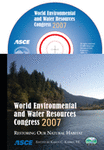Optimal Adaptive Water Quality Management under Uncertainty
Publication: World Environmental and Water Resources Congress 2007: Restoring Our Natural Habitat
Abstract
Despite significant improvements since passage of the Clean Water Act of 1972, the nation's water quality goals have not been achieved—there are over 300,000 river and shore miles and 5 million lake acres not meeting the designated uses set for them, according to a National Research Council (NRC) report in 2001 on the TMDL (Total Maximum Daily Load), water quality management (WQM) program. The NRC study authors identified several obstacles to effective management. Prominent among them was the recognition of the inability to make reliable water quality predictions. The study authors, citing the influential review paper of Beck state that there is "evidence to suggest that the current models of water quality, in particular the larger models, are capable of generating predictions to which little confidence can be attached." Largely in recognition of the large uncertainties in modeling to support WQM, a main recommendation of the NRC study was the adoption of an approach referred to as adaptive management; the USEPA subsequently adopted the adaptive management recommendation in its "twenty needs report". Adaptive management refers to a multi-stage decision-making process involving continual monitoring and adjustment of a WQM plan until water quality standards are achieved. The idea is not new. Walters and Hilborn advocated an approach of adaptive management given ecosystem modeling uncertainties; more recently, Prato. Adaptive management, as Walters and Hilborn defined it, treats "all management actions as deliberate experiments that (if properly designed) will have a dual effect of simultaneously producing short-term yields and better information for long-term management." This paper concerns optimal adaptive WQM. The challenges of optimal adaptive WQM are discussed, which include the need to model uncertainty resolution and account for irreversibility. Two optimization-based approaches to adaptive WQM are contemplated. The first considers optimal two-stage adaptive WQM. A solution method, Bayesian Programming, incorporates Monte Carlo methods for stochastic simulation and Bayesian analysis, and gradient-based methods for decision search. After recognizing its limitations, a second approach is described that involves the specification of heuristically formed decision rules for adaptive WQM in which automated search methods are applied to the optimization of the rule parameters. Different decision rules are formulated, each dictating a course of action based on the history of observations and decisions.
Get full access to this chapter
View all available purchase options and get full access to this chapter.
Information & Authors
Information
Published In
Copyright
© 2007 American Society of Civil Engineers.
History
Published online: Apr 26, 2012
Authors
Metrics & Citations
Metrics
Citations
Download citation
If you have the appropriate software installed, you can download article citation data to the citation manager of your choice. Simply select your manager software from the list below and click Download.
